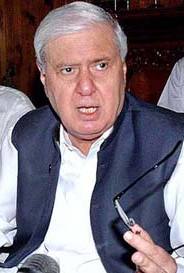 [DAWN] Bin Yameen will turn 19 this year, but he often wonders what his father, Baligh Jan, looks like now. His father would have been 48 this year; Jan was a labourer, who left home for jihad in Afghanistan on the directions of Tehrik-e-Nifazi-e-Shariat-e-Mohammadi (TNSM
[DAWN] Bin Yameen will turn 19 this year, but he often wonders what his father, Baligh Jan, looks like now. His father would have been 48 this year; Jan was a labourer, who left home for jihad in Afghanistan on the directions of Tehrik-e-Nifazi-e-Shariat-e-Mohammadi (TNSM...Tehreek-e-Nafaz-e-Shariat-e-Mohammadi (Movement for the Enforcement of Islamic Law) is a Pak militant group whose objective is to enforce their definition of Sharia law in Pakistain whether anybody wants it or not. It was founded by Sufi Muhammad in 1992, and was banned by President Musharraf in January, 2002 after Sufi dispatched several thousand yokels to Afghanistan to fight the infidel and ended up with most of them killed or captured and held for ransom. In 2007 TNSM took over Swat, which shows how well the
banningworked. TNSM is the Pony League of Islamic militancy..
) chief Maulana Sufi Mohammad.
"I often try to remember my father's face but it is difficult for me to visualise him, because I was just four years old at that time," says Bin Yameen.
A resident of Barawal Bandi village in the Upper Dir district of Khyber-Pakhtunkhwa
... formerly NWFP, still Terrorism Central...
, Bin Yameen laments that his family was unable to stop his father from leaving for Afghanistan along with the other villagers. He was adamant about supporting the Afghan Taliban in their fight against American forces.
"We are five sisters and three brothers. Four of my sisters are elder to me," says Bin Yameen. "It was difficult for my mother to meet the family's monthly expenses after my father left for the war in Afghanistan."
According to locals of various districts in Malakand division, over 10,000 people aged between 30 and 55 left for Afghanistan in 2001 to fight the US forces, on the directions of Maulana Sufi Mohammad. His organization, TNSM, was banned in 2002 by former President General (retired)
 Pervez
Pervez PervMusharraf
... former dictator of Pakistain, who was less dictatorial and corrupt than any Pak civilian government to date ...
. Not many of Sufi's jihadis returned home, not many have any traceable whereabouts either.
Over time, Bin Yameen's devastated family came to terms with their loss. The young mother focused all her energies on raising her children, while Bin Yameen's uncle took on the financial responsibility of providing for the family.
And yet, a great burden was also placed on Bin Yameen's young shoulders.
"In the mornings, I study; I am enrolled in class IX at the Government High School Chukyatan, which is some 4km away from my village. After school, I work in the vegetable market," explains Bin Yameen. When asked how he manages balancing studies and work, he says that it is difficult but he has no option. "My mother successfully arranged the marriages of four of my sisters, but I am still responsible for providing for my mother, two younger brothers and one more sister."
Bin Yameen takes his younger brother, 16-year-old Ameenullah, to work as well — the family supplements its income in any way they can. But unlike Bin Yameen, Ameenullah neither has a fleeting memory of his father nor has he ever seen a picture of him over the last 14 years. "I was two years old when he left," says Ameenullah.
Their family attempted to search for Baligh Jan in Kabul, but all efforts came to naught. "When my uncle visited Kabul to search for my father, all he returned with was an assurance by Red Thingy officials that they will try to locate him in Afghan prisons," says Bin Yameen. "Our mother has become mentally ill because of the continuous tension."
Meanwhile,
...back at the chili cook-off, Chuck and Manuel's rivalry was entering a new and more dangerous phase...
Ameenullah always feels his father's absence on occasions such as Eid or "when the fair comes to our village."
In Qader Kalay village of Upper Dir, 64-year-old Safia Bibi saw her son leave for Afghanistan in 2001 and her husband die soon after. She now works as domestic help in the homes of the rich.
"My 30-year-old son, Badshah Zada, worked as a labourer before leaving for Afghanistan. I advised him to cancel his plans but he refused; he was enamoured by jihad," says Safia Bibi.
Badshah Zada left his wife and two children in the care of his aging parents. After his father's demise, his mother assumed the role of sole breadwinner of the household. "I wish my son had refused to follow the rhetoric and directions of Sufi Mohammad," she says wistfully.
Unlike blue-collar Badshah Zada, 30-year-old Mohammad Mursaleen Khan was teaching at a local seminary in his native Qader Kalay. Like Badshah Zada, he also left for jihad. His 62-year-old father, Mohammedan Khan, is forced to work as a security guard of a school in Upper Dir city to meet the family's monthly expenses.
"Why would I be forced to work in this age if my son had not followed the directions of the TNSM chief?" he asks.
Twenty-eight-year-old Abdullah Jan works in Soddy Arabia
...a kingdom taking up the bulk of the Arabian peninsula. Its primary economic activity involves exporting oil and soaking Islamic rubes on the annual hajj pilgrimage. The country supports a large number of princes in whatcha might call princely splendor. When the oil runs out the rest of the world is going to kick sand in the Soddy national face...
as a labourer; he was forced to abandon higher education after his 50-year-old father, Barkat Jan, left their Kater village home in October 2001 — also for jihad in Afghanistan.
"My father was a farmer," says Abdullah Jan. "Of course, we depended on him to meet our monthly expenses. I failed to complete my higher studies due to the monetary problems of my family after he left us."
In Dogdara village of Upper Dir, 38-year-old Muftahuddin's cousin, 38-year-old Javed Khan, returned home after two-and-a-half-years since leaving in September 2001. His family paid Rs400,000 to Afghan officials for his safe return from jail in Jalalabad, or so they claim. They were one of the lucky ones.
But it is not just jihadis inspired and prepared by TNSM that are languishing in Afghan jails. Former Interior Minister Aftab Khan Sherpao
 ...Pak dynastic politician, head of his own branch of the Pakistan Peoples Party and former interior minister under Pervez Musharraf. Sharpao began the usual military career, rising to the rank of major, but when his elder brother was bumped off in 1975 he took up the political mantle. Aftab's family (known as the Khans of Sherpao) is a prominent and influential family in Khyber-Pakhtunkhwa. The family belongs to the Mohammadzai tribe which has for long been a dominant tribe amongst the Pukhtuns...
...Pak dynastic politician, head of his own branch of the Pakistan Peoples Party and former interior minister under Pervez Musharraf. Sharpao began the usual military career, rising to the rank of major, but when his elder brother was bumped off in 1975 he took up the political mantle. Aftab's family (known as the Khans of Sherpao) is a prominent and influential family in Khyber-Pakhtunkhwa. The family belongs to the Mohammadzai tribe which has for long been a dominant tribe amongst the Pukhtuns...says it is difficult for him to give an exact number of Pak prisoners in Afghanistan, but the figure could be in the hundreds.
"I discussed the issue of Pak prisoners with my Afghan counterparts on behalf of the Pak government but I did not get a positive response from Afghan authorities," he says. But even Sherpao is aware of the reports that the families of many Pak prisoners paid money to Afghan landlords and jail officials to secure the release of their loved ones after 2001.
Sahibzada Tariqullah, Member of the National Assembly from Upper Dir, agrees. He explains that thousands of Paks were either killed, imprisoned or went missing in Afghanistan during the war in 2001. Hundreds returned home with the support of the Red Thingy but there are reports of many more still languishing in Afghan prisons.
According to an official of the ministry of Foreign Affairs, it is difficult for the Pak missions to have an update on detained Pak nationals languishing in Afghan prisons due to the law and order situation there, as well as the existence of 'private' prisons run by the National Directorate of Security (NDS) in Afghanistan.
The officials claimed that over 185 Pak prisoners are currently being incarcerated in Afghan jails — 106 in Pul-e-Charkhi Jail in Kabul; 46 in Sarpoza Jail in Kandahar; 26 in Jalalabad; and the remaining in Helmand
...an Afghan province populated mostly by Pashtuns, adjacent to Injun country in Pak Balochistan...
, Herat
...a venerable old Persian-speaking city in western Afghanistan, populated mostly by Tadjiks, which is why it's not as blood-soaked as areas controlled by Pashtuns...
and Mazar Sharif.
"Back in 2001, the government did not prepare any lists of such Paks because it was trying to stop them from crossing the border in the first place," says Brigadier (retired.) Mahmood Shah, who served as the secretary of the Federally Administered Tribal Areas (Fata) between 2003 and 2005. He pins the blame on Sufi Mohammad for the killings and missing of thousands of Paks while their families are compelled to survive in difficult circumstances.
"Although Sufi Mohammad is responsible for the crises, but under the Geneva Convention it was the responsibility of the Afghan government to provide complete details about the POWs," argues I.A. Rehman, director of the Human Rights Commission of Pakistain (HRCP).
"If Pak prisoners are still being held in Afghanistan, it is contrary to all norms of humanity as well as in direct contravention of the Geneva Convention," adds Rehman.
Foreign Office Spokeswoman Tasneem Aslam meanwhile told Dawn that the Pakistain Embassy in Afghanistan is in process of securing the release of Pak prisoners. She claims that Pakistain and Afghanistan had already agreed to form a joint commission on prisoners in 2011, with Pakistain pushing for early activation of this mechanism.
As long drawn and extended as governmental procedures are, equally short and swift was Sufi Mohammad's message and the speed at which it was consumed. Latifullah, a 55-year-old local school teacher of Government High School Jan Bati, Lower Dir, recalls that people from different towns and villages of Malakand division left their homes to support the Taliban regime back in 2001.
Latifullah describes that most jihad volunteers belonged to the Matta area of district Swat, the Maidan area of Lower Dir, the Dir Kohistan
...a backwoods district of Khyber Pakhtunkhwa distinguished by being even more rustic than is the norm among the local Pashtuns....
area of district Upper Dir, Butkhela area of Malakand district, Aman Dara area of district Shangla and Alpori area of district Buner. Then there were others from Punjab,
 Mohmand Agency
Mohmand Agency... Named for the Mohmand clan of the Sarban Pahstuns, a truculent, quarrelsome lot. In Pakistain, the Mohmands infest their eponymous Agency, metastasizing as far as the plains of Peshawar, Charsadda, and Mardan. Mohmands are also scattered throughout Pakistan in urban areas including Karachi, Lahore, and Quetta. In Afghanistan they are mainly found in Nangarhar and Kunar...
and Bajaur Agency, aka Turban Central
...Smallest of the agencies in FATA. The Agency administration is located in Khar. Bajaur is inhabited almost exclusively by Tarkani Pashtuns, which are divided into multiple bickering subtribes. Its 52 km border border with Afghanistan's Kunar Province makes it of strategic importance to Pakistain's strategic depth...
.
A former member of TNSM, speaking to Dawn on condition of anonymity, narrates that Maulana Sufi Mohammad gathered all volunteers in the areas of Timergara and Bajaur for registration. "We just prepared the lists of the people by including their names and their areas; most people were farmers, labourers and unemployed. They left for the Afghan province of Kunar through the Ghakhi Pass, near the Laghari area in Bajaur Agency," he claims.
Caught between the two is Bin Yameen, who has an agonising 'last wish': "I wish I can see my father in my lifetime; I am hopeful he will return one day."
Will these families ever get closure?

 Pakistani authorities have arrested a man over a suicide attack at a mosque on Friday that killed at least 50 people. Police on Saturday picked up the suspect in Charsadda, the same district where a suicide bomber detonated around 10kg of explosives amid a packed 1,000-strong congregation celebrating the festival of Eid. "We're looking for another man who could be a second accomplice," a security official said.
Pakistani authorities have arrested a man over a suicide attack at a mosque on Friday that killed at least 50 people. Police on Saturday picked up the suspect in Charsadda, the same district where a suicide bomber detonated around 10kg of explosives amid a packed 1,000-strong congregation celebrating the festival of Eid. "We're looking for another man who could be a second accomplice," a security official said.  The prime minister and interior minister have rejected the Pakistan Peoples Party (PPP)s demand for foreign experts to assist in the inquiry into last Thursdays suicide bombings in Karachi, while PPP chief Benazir Bhutto has insisted the government isnt equipped to handle such an investigation.
The prime minister and interior minister have rejected the Pakistan Peoples Party (PPP)s demand for foreign experts to assist in the inquiry into last Thursdays suicide bombings in Karachi, while PPP chief Benazir Bhutto has insisted the government isnt equipped to handle such an investigation.
 Russian-made explosives were used in Saturdays suicide attack targeting Interior Minister Aftab Sherpao Khan, a police official said, as investigators launched a formal probe into the bombing. All the federal government agencies will assist the team, said Information Minister Muhammad Ali Durrani at a news conference in Peshawar after returning from the funerals of nine victims of the blast in Charsadda. He said that the bomber used eight to 10 kilograms of explosives and the death toll from the attack has risen to 28.
Russian-made explosives were used in Saturdays suicide attack targeting Interior Minister Aftab Sherpao Khan, a police official said, as investigators launched a formal probe into the bombing. All the federal government agencies will assist the team, said Information Minister Muhammad Ali Durrani at a news conference in Peshawar after returning from the funerals of nine victims of the blast in Charsadda. He said that the bomber used eight to 10 kilograms of explosives and the death toll from the attack has risen to 28.